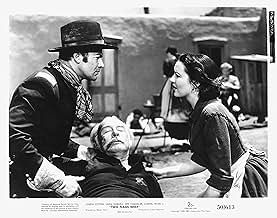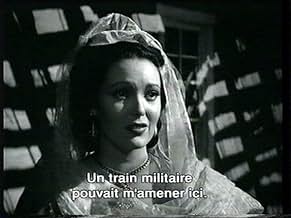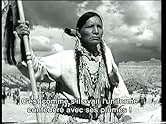IMDb RATING
6.7/10
1.3K
YOUR RATING
Forced by circumstances, Confederate POWs and Union soldiers join forces against Indians - but old animosities resurface during their fragile alliance.Forced by circumstances, Confederate POWs and Union soldiers join forces against Indians - but old animosities resurface during their fragile alliance.Forced by circumstances, Confederate POWs and Union soldiers join forces against Indians - but old animosities resurface during their fragile alliance.
- Director
- Writers
- Stars
Noah Beery Jr.
- Cy Davis
- (as Noah Beery)
Johnny Sands
- Lt. Adams
- (as John Sands)
Robert Adler
- Hank
- (uncredited)
Stanley Andrews
- Col. Hoffman
- (uncredited)
Jose Baca
- Undetermined Secondary Role
- (uncredited)
Marjorie Bennett
- Mrs. Simpkins
- (uncredited)
Chet Brandenburg
- Confederate Soldier
- (uncredited)
Bertha Brennan
- Undetermined Secondary Role
- (uncredited)
Buck Bucko
- Confederate Soldier
- (uncredited)
Bill Burch
- Undetermined Secondary Role
- (uncredited)
- Director
- Writers
- All cast & crew
- Production, box office & more at IMDbPro
Featured reviews
Jeff Chandler is cast against type (and does a terrific job) in this big-budget western as the commander of a cavalry fort in the West during the Civil War who hates both Indians and Southerners with equal passion. With his command stripped to the minimum due to the Union's need for troops to fight the Civil War back east, Chandler is forced to accept a unit of Confederate prisoners who have volunteered to fight Indians under Union command as an alternative to rotting in POW camps. Chandler's all-consuming hatred and racism result in his killing the son of the local Indian chief, which causes the Indians to go on a rampage against the whites in the area, culminating in a massive attack against the fort itself. This is a dark, gritty and, considering the time in which it was made, brutally graphic and violent western that explores and exposes issues--racism, sexual tension, even a hint of mental illness--seldom, if ever, touched upon by westerns up to that time. The supporting performances by Joseph Cotten, Linda Darnell and especially the great--and always underrated--Arthur Hunnicutt are top-notch, but this really belongs to Chandler, and he does a tremendous job, as good as (and in some ways better than) what is usually considered to be his finest performance, that of Indian chief Cochise in "Broken Arrow" of a few years later. Chandler was never a particularly expressive or emotional actor--when he tried to be, the results sounded more like a lecture (his speech at the end of "Pillars of the Sky" is a case in point)--but his coldness works to his advantage here, which makes his bursts of anger and hatred all the more chilling. This is an intelligent and thoughtful yet also rousing and action-filled western, hardly your run-of-the-mill cavalry-vs.-Indians tale. I don't think this would be the kind of western John Ford would have made, and it's probably the better for it. Don't miss it.
JEFF CHANDLER does a creditable job as tough Army Major Kenniston at Fort Thorn with a hatred of Confederate rebels. His sister-in-law LINDA DARNELL wants to go back to California from the New Mexico fort, but Chandler is smitten with her and tries to prevent the strong-willed lady from having her own way.
Meantime, two other men have their eyes on Linda--Confederate Col. Clay Tucker (JOSEPH COTTEN) and dashing Capt. Mark Bradford (CORNEL WILDE), both of whom fall for Major Kenniston's sister-in-law.
Seems the Yankees are willing to free Confederate prisoners if they're willing to help them fight off the Indians surrounding the fort. While this is the major plot driven device, the romantic sub-plots involving Chandler, Darnell, Wilde and Cotten get a fair share of time too.
It all comes together as an above average cavalry western under the crisp direction of Robert Wise, who makes the most of some excellent camera work in the rugged western settings. The story has some interesting components but takes time in setting up the various conflicts. Nevertheless, enough action and a little romance to satisfy most viewers of the genre.
Meantime, two other men have their eyes on Linda--Confederate Col. Clay Tucker (JOSEPH COTTEN) and dashing Capt. Mark Bradford (CORNEL WILDE), both of whom fall for Major Kenniston's sister-in-law.
Seems the Yankees are willing to free Confederate prisoners if they're willing to help them fight off the Indians surrounding the fort. While this is the major plot driven device, the romantic sub-plots involving Chandler, Darnell, Wilde and Cotten get a fair share of time too.
It all comes together as an above average cavalry western under the crisp direction of Robert Wise, who makes the most of some excellent camera work in the rugged western settings. The story has some interesting components but takes time in setting up the various conflicts. Nevertheless, enough action and a little romance to satisfy most viewers of the genre.
This gritty western is a post-Civil War affair set in New Mexico where soldiers of the Blue and the Gray are obliged to let bygones be bygones and tame the wild frontier for westward expansion. The usual antagonisms are present in abundance, with Union officers reluctant to trust the Confederate troops and question their allegiance to the United States. A top cast is headed by Joseph Cotten and Jeff Chandler, who constantly spar with each other about men, munitions and how to meet the Indian threat. Linda Darnell is the lone femme in the cast and her presence sparks romantic interest and jealousy in equal measure at the army post. The Yank-Rebel forces manage to put their bickering aside to defend against an Indian attack that remains one of the best ever filmed. The black and white lensing is good and enhances director Robert Wise's fine film.
Two Flags West is directed by Robert Wise and adapted to screenplay by Casey Robinson from a story by Frank S. Nugent and Curtis Kenyon. It stars Joseph Cotten, Linda Darnell, Jeff Chandler, Cornel Wilde, Dale Robertson, Jay C. Flippen, Noah Beery Jr., Harry von Zell, Johnny Sands and Arthur Hunnicutt. Music is by Hugo Friedhofer and cinematography by Leon Shamroy.
"On December 8th, 1863, President Abraham Lincoln issued a Special Proclamation, whereby Confederate Prisoners of War might gain their freedom, provided they would join the Union Army to defend the frontier West against the Indians."
A great premise drives this brooding yet action pumped Western forward, a production bolstered by crisp black and white location photography at San Ildefonso Pueblo, New Mexico, skilled direction by multi-genre director Wise and characterisations rich in thought and human interest value.
Film essentially centres around the workings of Fort Thorn, a Union Army stronghold commanded by embittered Maj. Henry Kenniston (Chandler). As he takes delivery of a unit of Confederate prisoners from Rock Island Prison Camp, themselves commanded by Col. Clay Tucker (Cotten), he struggles to contain his distaste. Something which obviously isn't helping an already pressure cooker atmosphere as groups of men divided by the on going war, are expected to stand or fall next to each other against the looming presence of chief Satank and his army of braves.
As the screenplay rolls on we learn about the main players beliefs and reasons for such, with the tragedy of the war deftly born out by the actors in their portrayals. The presence of widow Elena Kenniston (Darnell) also is cause for simmering tensions, where although an underwritten potential love triangle sometimes feels like a token offering on the edges of the frame, her character is so well drawn into the moody atmosphere, her back story packing emotional sting, that the film benefits from this case of testosterone lowering.
In amongst the Fort's uneasy alliance there are devious plans afoot on both sides of the coalition, that is to be expected, for it would be pretty standard stuff if these guys all agreed to shake hands and get on with it. But again the screenplay delivers some well thought out scenarios where agents and spies come into play, the safe transporting of civilians away from the Fort throws up some spice, as does a desperate act of violence by Major Kenniston. It all builds to a head and then Wise unleashes his skills as a overseer of action.
The crowning moment comes with the Indian attack on Fort Thorn. It's a prolonged attack filled with hundreds of extras and action aplenty. Each frame shot by Wise features flying bodies, arrows and bullets making their mark, fire raging in all parts of the ravaged Fort. Men, women and even children taking up the good fight as well, the Indian braves a fearsome and athletic foe coming in continuous waves. And this is not some Western where all the characters we have come to know are going to be singing come the end, some will die and it makes for dramatic and emotional impact.
Great cast, great direction and a great screenplay, this definitely deserves to be better known and loved by those into Westerns/Civil War movies. 8.5/10
"On December 8th, 1863, President Abraham Lincoln issued a Special Proclamation, whereby Confederate Prisoners of War might gain their freedom, provided they would join the Union Army to defend the frontier West against the Indians."
A great premise drives this brooding yet action pumped Western forward, a production bolstered by crisp black and white location photography at San Ildefonso Pueblo, New Mexico, skilled direction by multi-genre director Wise and characterisations rich in thought and human interest value.
Film essentially centres around the workings of Fort Thorn, a Union Army stronghold commanded by embittered Maj. Henry Kenniston (Chandler). As he takes delivery of a unit of Confederate prisoners from Rock Island Prison Camp, themselves commanded by Col. Clay Tucker (Cotten), he struggles to contain his distaste. Something which obviously isn't helping an already pressure cooker atmosphere as groups of men divided by the on going war, are expected to stand or fall next to each other against the looming presence of chief Satank and his army of braves.
As the screenplay rolls on we learn about the main players beliefs and reasons for such, with the tragedy of the war deftly born out by the actors in their portrayals. The presence of widow Elena Kenniston (Darnell) also is cause for simmering tensions, where although an underwritten potential love triangle sometimes feels like a token offering on the edges of the frame, her character is so well drawn into the moody atmosphere, her back story packing emotional sting, that the film benefits from this case of testosterone lowering.
In amongst the Fort's uneasy alliance there are devious plans afoot on both sides of the coalition, that is to be expected, for it would be pretty standard stuff if these guys all agreed to shake hands and get on with it. But again the screenplay delivers some well thought out scenarios where agents and spies come into play, the safe transporting of civilians away from the Fort throws up some spice, as does a desperate act of violence by Major Kenniston. It all builds to a head and then Wise unleashes his skills as a overseer of action.
The crowning moment comes with the Indian attack on Fort Thorn. It's a prolonged attack filled with hundreds of extras and action aplenty. Each frame shot by Wise features flying bodies, arrows and bullets making their mark, fire raging in all parts of the ravaged Fort. Men, women and even children taking up the good fight as well, the Indian braves a fearsome and athletic foe coming in continuous waves. And this is not some Western where all the characters we have come to know are going to be singing come the end, some will die and it makes for dramatic and emotional impact.
Great cast, great direction and a great screenplay, this definitely deserves to be better known and loved by those into Westerns/Civil War movies. 8.5/10
"Two Flags West" is a real surprise, entertaining and powerful. It contains its share of Hollywood clichés: Yankees and Rebels teaming up to fight Indians; an unhinged officer commanding a lonely outpost; a beautiful women creating tension among comrades in arms. But it's original in the way it handles them.
Jeff Chandler plays Maj. Henry Kenniston, a Union officer put in charge of a desert fort after being partially disabled by a war wound. Distrustful of Indians and bitter about his assignment, he dreams of returning to the war and taking revenge on the Confederates who hurt him and killed his brother.
Worst of all, Kenniston is obsessed with his brother's widow (played by Linda Darnell). He's an honorable man in his own way, and he feels a genuine sense of responsibility toward her. He tells himself he's keeping her at the fort for her own protection. But in his heart, he lusts after her, and he hates himself for doing so.
When reinforcements arrive at this troubled outpost, Kenniston is shocked to find that most are former Confederate POWs. They have pledged to serve the Union as Indian fighters as long as they don't have to make war on fellow Southerners.
To the already unstable major, being put in command of such troops is a crushing insult. And it doesn't help his state of mind when the Southerners' leader (played by Joseph Cotten) and an idealistic Union officer (played by Cornel Wilde) begin to show interest in the beautiful widow themselves. Kenniston soon embarks on a course of action guaranteed to alienate both the Indians and the Southerners -- and endanger the peace.
"Two Flags West" is a well plotted western, with events that flow from the characters' motivations instead of from a predictable plot. It's full of action, and its violence is grimly realistic for the time it was made.
Chandler is excellent as a complex, disastrous leader who inspires anger, pity and even some admiration in the viewer. Darnell, in one of her better roles, makes a convincing object of desire. Cotten and Wilde are fine, although they could have switched roles and still been just as effective.
Any fan of westerns ought to enjoy this a lot, and non-fans should give it a look.
Jeff Chandler plays Maj. Henry Kenniston, a Union officer put in charge of a desert fort after being partially disabled by a war wound. Distrustful of Indians and bitter about his assignment, he dreams of returning to the war and taking revenge on the Confederates who hurt him and killed his brother.
Worst of all, Kenniston is obsessed with his brother's widow (played by Linda Darnell). He's an honorable man in his own way, and he feels a genuine sense of responsibility toward her. He tells himself he's keeping her at the fort for her own protection. But in his heart, he lusts after her, and he hates himself for doing so.
When reinforcements arrive at this troubled outpost, Kenniston is shocked to find that most are former Confederate POWs. They have pledged to serve the Union as Indian fighters as long as they don't have to make war on fellow Southerners.
To the already unstable major, being put in command of such troops is a crushing insult. And it doesn't help his state of mind when the Southerners' leader (played by Joseph Cotten) and an idealistic Union officer (played by Cornel Wilde) begin to show interest in the beautiful widow themselves. Kenniston soon embarks on a course of action guaranteed to alienate both the Indians and the Southerners -- and endanger the peace.
"Two Flags West" is a well plotted western, with events that flow from the characters' motivations instead of from a predictable plot. It's full of action, and its violence is grimly realistic for the time it was made.
Chandler is excellent as a complex, disastrous leader who inspires anger, pity and even some admiration in the viewer. Darnell, in one of her better roles, makes a convincing object of desire. Cotten and Wilde are fine, although they could have switched roles and still been just as effective.
Any fan of westerns ought to enjoy this a lot, and non-fans should give it a look.
Did you know
- TriviaJeff Chandler, who was in the very early stages of his career, admired Joseph Cotten so much that he would show up to watch the veteran actor work even when he was not scheduled to be there.
- GoofsThe film is set in 1864 but the pistol a trooper uses to nail up a picture appears to be a Remington model 1875 Single Action Army Revolver using metallic cartridges which wasn't introduced until 1875. He should have carried either a Colt 1860 Cap & Ball revolver or a Remington 1858 Cap & Ball revolver.
- ConnectionsFeatured in The Making of 'The Day the Earth Stood Still' (2008)
- How long is Two Flags West?Powered by Alexa
Details
- Runtime1 hour 32 minutes
- Color
- Aspect ratio
- 1.37 : 1
Contribute to this page
Suggest an edit or add missing content




































